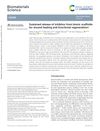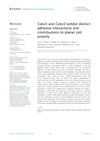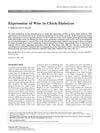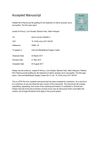 14 citations,
October 2016 in “Psychoneuroendocrinology”
14 citations,
October 2016 in “Psychoneuroendocrinology” Finasteride affects brain processes related to neurotransmission and metabolism, potentially helping with neuropsychiatric conditions.
 14 citations,
May 2008 in “Journal of proteome research”
14 citations,
May 2008 in “Journal of proteome research” Dutasteride may help reduce brain plaque linked to Alzheimer's by affecting cell energy structures and waste removal.
 14 citations,
January 2004 in “BJUI”
14 citations,
January 2004 in “BJUI” Finasteride can treat prostatic haematuria, but its use is controversial.
 12 citations,
April 2015 in “InTech eBooks”
12 citations,
April 2015 in “InTech eBooks” Platelet Rich Plasma (PRP) shows promise for tissue repair and immune response, but more research is needed to fully understand it and optimize its use.
 11 citations,
April 2013 in “SpringerPlus”
11 citations,
April 2013 in “SpringerPlus” Human skin's melanocytes respond to light by changing shape, producing pigments and hormones, which may affect sleep patterns.
 11 citations,
December 2011 in “Biochemical journal”
11 citations,
December 2011 in “Biochemical journal” Neurotrophin-4 increases calcium current in specific mouse neurons through the PI3K pathway.
 10 citations,
January 2014 in “BioMed research international”
10 citations,
January 2014 in “BioMed research international” Rat whisker cells can help turn other cells into nerve cells and might be used to treat brain injuries or diseases.
 9 citations,
November 2018 in “Drug Discovery Today”
9 citations,
November 2018 in “Drug Discovery Today” Using skin stem cells and certain molecules might lead to scar-free skin healing.
 9 citations,
December 2014 in “Neuropsychiatric Disease and Treatment”
9 citations,
December 2014 in “Neuropsychiatric Disease and Treatment” People with first-time vitiligo have lower levels of a certain brain protein compared to healthy individuals.
 9 citations,
March 2009 in “Psychoneuroendocrinology”
9 citations,
March 2009 in “Psychoneuroendocrinology” Certain gene variations are linked to better memory in healthy Chinese women.
 8 citations,
December 2020 in “The FASEB Journal”
8 citations,
December 2020 in “The FASEB Journal” Blocking adenosine A2B receptor may prevent or treat hearing loss.
 8 citations,
October 2020 in “Lasers in Medical Science”
8 citations,
October 2020 in “Lasers in Medical Science” LLLT helps treat hair loss by increasing blood flow, reducing inflammation, and stimulating growth factors.
 8 citations,
January 2020 in “Biomaterials Science”
8 citations,
January 2020 in “Biomaterials Science” Researchers developed a scaffold that releases a healing drug over time, improving wound healing and skin regeneration.
 8 citations,
June 2019 in “Scientific Reports”
8 citations,
June 2019 in “Scientific Reports” Increased PPARGC1α relates to hair thinning in common baldness.
 7 citations,
January 2023 in “Frontiers in cell and developmental biology”
7 citations,
January 2023 in “Frontiers in cell and developmental biology” Celsr1 is crucial for skin cell alignment, while Celsr2 has little effect on this process.
 7 citations,
January 2018 in “Neurodegenerative Diseases”
7 citations,
January 2018 in “Neurodegenerative Diseases” Researchers found a new ABCD1 gene mutation linked to a rare brain and nerve disorder with unusual brain changes.
 7 citations,
March 2014 in “ISRN Biomaterials”
7 citations,
March 2014 in “ISRN Biomaterials” Keratin hydrogel from human hair helps rats recover better from spinal cord injuries.
 6 citations,
September 2020 in “Advanced Biology”
6 citations,
September 2020 in “Advanced Biology” Blue-light activation of TrkA improves hair-follicle stem cells' ability to become neurons and glial cells.
 6 citations,
July 2007 in “Developmental Dynamics”
6 citations,
July 2007 in “Developmental Dynamics” The molecule Wise is involved in the development of various structures in chick embryos.
 5 citations,
October 2020 in “Brain Research Bulletin”
5 citations,
October 2020 in “Brain Research Bulletin” Etifoxine, an anxiety drug, can lessen brain inflammation and cognitive issues in mice, partly by increasing production of protective brain steroids.
 4 citations,
July 1994 in “Clinics in Dermatology”
4 citations,
July 1994 in “Clinics in Dermatology” Eosinophilia-myalgia syndrome, linked to contaminated L-tryptophan supplements, caused severe symptoms and some deaths, with long-term effects in survivors.
 3 citations,
July 2021 in “Life science alliance”
3 citations,
July 2021 in “Life science alliance” PNKP is essential for keeping adult mouse progenitor cells healthy and growing normally.
 3 citations,
September 2018 in “Journal of Biomaterials Science, Polymer Edition”
3 citations,
September 2018 in “Journal of Biomaterials Science, Polymer Edition” Different materials affect the growth of brain cells and fibroblasts, with matrigel being best for brain cell growth.
 3 citations,
August 2017 in “Oral and Maxillofacial Surgery Cases”
3 citations,
August 2017 in “Oral and Maxillofacial Surgery Cases” Using platelet-rich plasma and fat grafting to treat nerve pain showed promising results with no side effects.
 2 citations,
November 2022 in “Scientific reports”
2 citations,
November 2022 in “Scientific reports” Using gelatin sponges for deep skin wounds helps bone marrow cells repair tissue without scarring.
 2 citations,
January 2019 in “Medizinische Genetik”
2 citations,
January 2019 in “Medizinische Genetik” The document reports findings on genetic research, including ethical concerns about genome editing, improved diagnosis of mitochondrial mutations, solving inherited eye diseases, confirming gene roles in epilepsy, linking a gene to aneurysms, and identifying genes associated with age-related macular degeneration.
 2 citations,
January 2018 in “European journal of pediatric surgery reports”
2 citations,
January 2018 in “European journal of pediatric surgery reports” A baby girl's hair turned straight on one side due to a neck tumor and surgery, but it returned to curly as she recovered.
 2 citations,
April 2016 in “The Journal of Urology”
2 citations,
April 2016 in “The Journal of Urology” Finasteride 1mg linked to diverse symptoms; other treatments improve erectile function in rats.
 2 citations,
November 2015 in “Journal of Investigative Dermatology”
2 citations,
November 2015 in “Journal of Investigative Dermatology” RANKL improves the immune response against herpes simplex virus by enhancing T cell activation and could help develop better treatments or vaccines.
 2 citations,
October 2015 in “Human Gene Therapy”
2 citations,
October 2015 in “Human Gene Therapy” The congress highlighted new gene therapy techniques and cell transplantation methods for treating diseases.






























